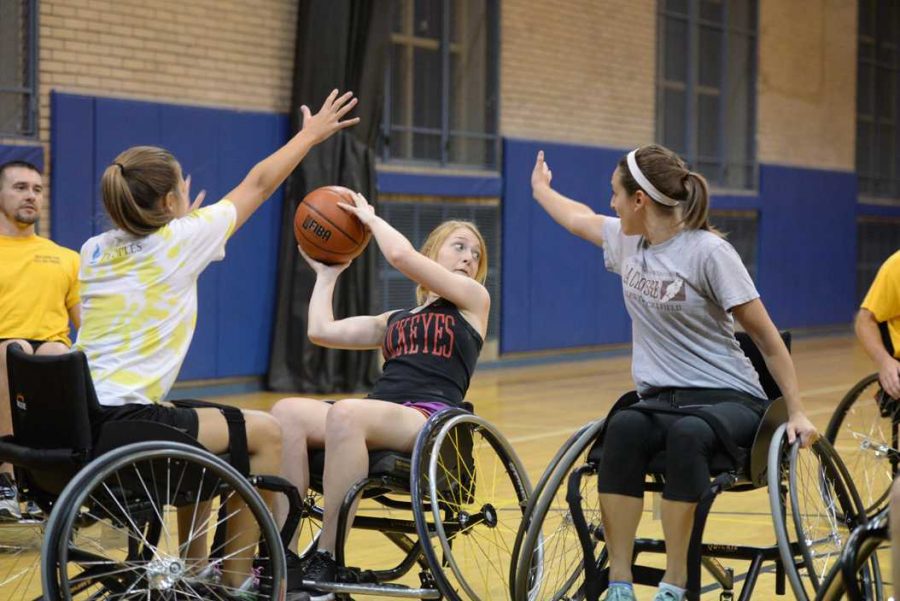Brandon Daveler was perplexed. The inaugural wheelchair basketball practice for the semester was supposed to take place the first Thursday after school started — but no one showed up.
Instead, a wheelchair with a basketball on its seat sat alone in the corner of the second-floor Bellefield gym.
After a summer of anticipation for Pitt’s new adaptive sports program, the first week’s no-show turnout was not a good start for a program that provided sports options on campus for students with disabilities. Was it doomed before it even began?
“I think people were busy,” Daveler, the current president of Students for Disability Advocacy at Pitt, said. “It [was] the first week, and everyone assumed that enough people would go. I was planning to go next week, but from my understanding, there was supposed to be a practice, so I don’t know why no one showed up.”
But when the second practice rolled around the following Thursday night, the first week seemed like an anomaly after an abundance of players scurried around Bellefield to pull out the wheelchairs from storage and start the semester’s first game of wheelchair basketball.
The game was organized in part because Pitt announced late last spring that it would take the necessary steps toward establishing an adaptive sports program on campus, starting with wheelchair basketball. Organizers hoped that once practices began, enough people would join to create a team which could someday play at a competitive collegiate level against other schools.
Wheelchair basketball is a sport that requires no running or dunking. It requires all participants to have their feet firmly set in place while only using their arms to maneuver the wheelchair and shoot the ball. Otherwise, the rules and regulations from basketball pertain.
“It’s like elementary school,” first-year occupational therapy graduate student Alexa Schreiber said. “They pick captains, and then the other players get picked, and you feel like you don’t want to be picked last … [Wheelchair basketball] is really cool because people get to play basketball when they wouldn’t normally play a sport like this.”
Practices are open to anyone in the community, regardless of whether they are a student at Pitt or have a disability. About three or four members from the SteelWheelers –– a professional wheelchair basketball team from Pittsburgh –– participate each week with the remainder of the players being students from Pitt.
In particular, a group of able-bodied graduate students majoring in occupational therapy have taken an interest in attending weekly practices and playing the sport. About 10 to 15 individuals show up every week to do a half hour of group warmups in the specialized chairs before taking turns playing in an hour-long game of five-on-five wheelchair basketball
As of now, wheelchair basketball is the only adaptive sport offered at Pitt. The practices take place on Thursday nights from 6:30 p.m. to 8:30 p.m.
Power soccer—a sport specifically meant for people who have limited functionality in their muscles from disabilities like quadriplegia, multiple sclerosis and muscular dystrophy — will begin once Pitt gets the necessary equipment.
Pitt’s Students for Disability Advocacy is still looking for donors who want to provide for the required extra guards — which cost around $500 each — that attach to the bottom of an automated wheelchair to guide the ball.
According to Sam Vescovi, Pitt’s assistant director of operations for Intramural and Recreations, the University finally got the specialized chairs for wheelchair basketball — with lightweight slanted wheels and lower backrests — with the help of Daveler.
Daveler reached out to Azalea Charities and its CEO Frank Lasch, who agreed to donate five basketball wheelchairs worth $11,178 to the group.
The chairs, which arrived two weeks ago, are used in addition to five chairs borrowed from the SteelWheelers, who also store their chairs in Bellefield Hall.
“We’re still hoping to get a grant for five more wheelchairs,” Daveler said. “That way we can have [our own] full set of 10 chairs for future games.”
The club started practicing during the summer and had about 10 athletes showing up each week. Former SteelWheelers coach Marshall Lee Tempest led the practices and was supposed to lead the new Pitt group in the fall.
However, after receiving an offer to coach for the Cleveland Wheelchair Cavaliers –– an elite wheelchair basketball team in Ohio –– Tempest moved on. Chris Mielo, the new head coach of the SteelWheelers, took his place.
“We’re really pushing for anyone with a disability to come out for these practices,” Mielo said. “Whether they have played before or are a novice, just experiencing how to push around the chair is a great experience.”
Vescovi and other members of the club see the program going competitive once a team officially forms. This will make Pitt one of only about 14 schools nationwide to offer a competitive adaptive sports program.
In the meantime, the club plans to make its presence known on campus.
The club will make an appearance at Ballin’ on Bigelow on Oct. 2, when Bigelow Boulevard will shut down for the day to host three-on-three basketball games –– including a game of wheelchair basketball.
The club also hopes to secure a spot on the court during halftime of the 2016 Pitt men’s basketball ACC opener against Notre Dame on New Year’s Eve.
By the spring, SDA wants to hold intramural games involving members of Pitt’s Greek life as well as play other competitive teams in the area, like the wheelchair basketball team from Edinboro University of Pennsylvania.
“I hope students who come out and play pass along their experience to their friends and colleagues about how difficult yet fun playing basketball in a wheelchair is,” Daveler said. “Anyone can play wheelchair basketball — you don’t have to have a disability.”


